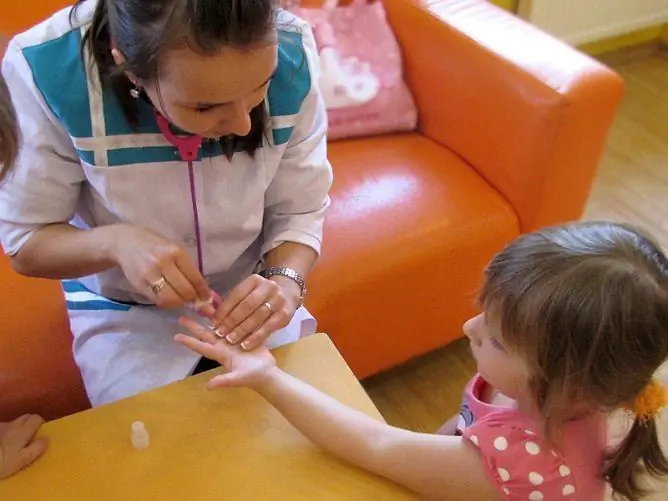- Author Rachel Wainwright wainwright@abchealthonline.com.
- Public 2023-12-15 07:39.
- Last modified 2025-11-02 20:14.
Cretinism
The content of the article:
- Causes of cretinism
- Forms of cretinism
- Symptoms of cretinism
- Diagnosis of cretinism
- Cretinism treatment
- Complications of cretinism
- Forecast
- Prevention of cretinism
Cretinism (from the French cretinisme - dementia) is a pathology of the endocrine system, which develops as a result of a violation of the hormone-synthesizing function of the thyroid gland and is manifested by a delay in physical, intellectual, mental development and a complex violation of the work of internal organs.

The full synthesis of thyroid hormones with the obligatory participation of iodine activates the metabolism, the work of the nervous system and the endocrine glands, accelerates the process of protein synthesis and decay, affects the interaction and stability of all body systems. Lack of thyroid hormones during intrauterine maturation and at an early age becomes the cause of the development of cretinism.
The disease is diagnosed in 1 in 4,000 children. Signs of cretinism appear from birth and gradually increase in the future. During breastfeeding, the manifestations of cretinism are less pronounced, since the child receives thyroid hormones along with breast milk.
Causes of cretinism
Causes of cretinism:
- iodine deficiency in the mother's body during gestation;
- living in an area with iodine deficiency;
- endemic goiter in the mother, which arose during pregnancy;
- congenital malformations and anomalies of the thyroid gland (hypoplasia, aplasia, dystopias, etc.);
- congenital athyroidism;
- ectopia of thyroid tissue;
- taking thyreostatic drugs during pregnancy;
- hereditary immunity of the thyroid gland to pituitary thyrotropin; tissue resistance to the action of thyroid hormones;
- genetic abnormalities, as a result of which the mechanism of capture and retention of iodine by the thyroid gland is disrupted;
- previously performed operations on partial or complete removal of the thyroid gland;
- exposure to ionizing radiation (radiation, radioactive iodine) during pregnancy;
- Hashimoto's thyroiditis (autoimmune chronic inflammation of the thyroid gland);
- lack of iodine, selenium and other trace elements in food and the environment;
- violation of the biosynthesis of thyroid hormones;
- dysfunction of the pituitary gland, hypothalamus;
- marriages between people who are in close family ties.
Forms of cretinism
Depending on the etiology, there are:
- endemic cretinism - manifests itself from birth, arises as a result of insufficient intake of iodine in the body in the area of residence. A genetic predisposition is possible. It often develops in families in which there are marriages between blood relatives;
- sporadic cretinism (Phage disease) - occurs in early childhood as a result of dysfunction of the thyroid gland after its normal functioning for some time. The cause of such violations can be hypoxia, trauma, intoxication, hemorrhages in the tissue of the thyroid gland, pituitary gland, hypothalamus, inflammatory and autoimmune processes, deficiency of enzyme systems, iodine deficiency, increased binding of thyroid hormones to blood proteins.
Endemic cretinism has three forms:
- neurological - accompanied by hearing and vision impairments;
- myxedema - manifested, first of all, by a lag in physical development;
- mixed.
Such a concept as topographic cretinism is widespread - a violation of spatial orientation skills, a person's inability to navigate the terrain. This psychological feature is explained by a decrease in the activity of the right hemisphere of the brain and has nothing to do with true cretinism. Individuals suffering from topographic cretinism may experience anxiety, fear of getting lost. If this disorder is not associated with the presence of an organic disease, then it is recommended to use methods of training memory and spatial imagination.
Symptoms of cretinism
Children with cretinism have a characteristic appearance: a deformed skull with thickened frontal and parietal bones; a round, wide, pasty face, a flat and wide nose with a sunken back, narrow, far-set eyes, rough facial features, a thick and short neck with an enlarged, protruding thyroid gland.
Due to swelling of the tongue, it does not fit in the mouth, the mouth is slightly open, the tip of the tongue sticks out. They are short, have a disproportionate body, deformed joints and limbs, the mobility of the joints, including the spine, is limited. The skin is rough, the hair is scanty, the hairline is low. In older age, there is an underdevelopment of secondary sexual characteristics. Also inherent:
- myxedema edema (face, limbs);
- poor facial expressions;
- impaired speech and hearing;
- decreased sense of smell;
- dry hair, brittle nails;
- abnormally low sweating.
In addition, cretinism has the following manifestations:
- post-term pregnancy, large body weight at birth;
- late umbilical cord falling off;
- slow weight gain, decreased appetite;
- frequent constipation, bloating;
- low activity, lethargy, drowsiness;
- lack of response to sound and light;
- difficulty in nasal breathing (due to swelling of the nasal mucosa);
- large fontanelle is increased in size, does not overgrow for a long time;
- long-term non-passing jaundice of newborns caused by hyperbilirubinemia;
- low heart rate;
- low blood pressure;
- internal organs are reduced in size;
- umbilical hernia;
- late eruption, delayed change of teeth;
- underdevelopment of the gonads, cryptorchidism is possible;
- mental and intellectual development disorders.
The intensity of the symptoms of cretinism depends on the age at which the disease arose: with congenital cretinism, its symptoms are more pronounced. If the disease appears in 3-5 years, severe mental abnormalities do not develop, however, there is a decrease in intelligence, weakening of mental abilities, puberty is delayed.
Diagnosis of cretinism
Congenital cretinism in children is diagnosed immediately after birth; characteristic external signs of pathology draw attention to themselves. Congenital lack of thyroid hormones is detected by a newborn screening test (blood tests of all newborns for thyroid and pituitary hormones), which are performed in the first week of life. In this case, a blood sample is taken from the heel. On the second or third day of life, a blood test is performed for the hormones TSH or thyroxine (T4). A compensatory increase in the level of TSH in the blood indicates an insufficient function of the thyroid gland.

Source: kroha.net
A comprehensive diagnostic examination is based on clinical, laboratory and X-ray analyzes:
- clinical blood test;
- determination of the level of thyroid hormones and thyroid-stimulating hormone;
- analysis for the presence of antithyroid antibodies;
- Ultrasound of the thyroid gland;
- X-ray of the skull to exclude a pituitary tumor;
- X-ray of the legs (examination of the state of the femoral head and knee joints).
Cretinism treatment
When diagnosed with insufficient thyroid function, treatment should be started as early as possible, it includes:
- taking synthetic analogues of thyroid hormones;
- the use of drugs with a high iodine content;
- treatment of concomitant diseases of the cardiovascular, musculoskeletal, nervous system.
Hormone replacement therapy is carried out throughout life. The dosage of drugs is selected by the endocrinologist based on the results of the examination, taking into account the age, weight of the patient, and the severity of symptoms.
In addition, vitamins A and B12 are indicated. In some cases, there is a need to prescribe drugs that improve cerebral circulation, normalize the activity of the cardiovascular system, the digestive tract.
Complications of cretinism
Without proper treatment, the symptoms of cretinism progress to the formation of irreversible changes in the cardiovascular, nervous, respiratory, musculoskeletal and other systems.
Forecast
If the treatment is started in the first two weeks of a child's life and is selected correctly, the development of severe pathology can be avoided. With the treatment started on time, the child generally develops normally, but has some deviations in the intellectual and physical terms. If hormonal correction is started later than 4-6 weeks after birth, there is a high likelihood of developing irreversible mental retardation and other severe complications.
Prevention of cretinism
Prevention of cretinism:
- timely prevention and, if necessary, treatment of thyroid diseases;
- a balanced diet in macro- and micronutrients during pregnancy, it is especially important to have a sufficient iodine content;
- medical monitoring of the thyroid gland at all stages of pregnancy;
- early diagnosis of cretinism in children, screening studies;
- mass iodine prevention of thyroid diseases in areas with low iodine levels in water and soil;
- individual iodine prophylaxis.
YouTube video related to the article:

Anna Kozlova Medical journalist About the author
Education: Rostov State Medical University, specialty "General Medicine".
The information is generalized and provided for informational purposes only. At the first sign of illness, see your doctor. Self-medication is hazardous to health!






